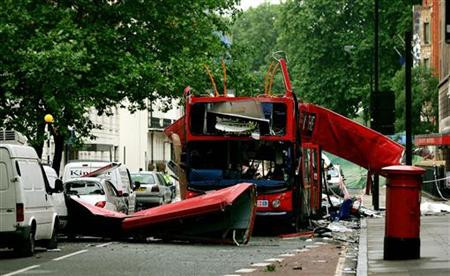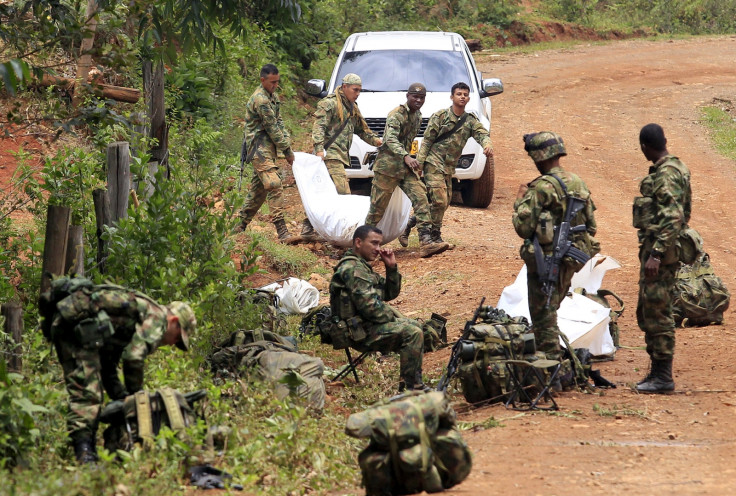Ten years on from London terror attacks, time is ticking down to Europe's next major bomb blast

As victims from bombings increase for the third year running, states should respond to the global harm caused explosive weapons.
The witnessing of a bomb blast is an intimate memory that is yours, and yours alone, to bear. Each person, seeing such horrors, will long remember the splice and the maul that follows a deadly explosion.
FARC, a Colombian rebel group, had targeted someone's home in the sleepy town of San Vicente del Caguán. It was close to my hotel and, on hearing the blast, I had run out into the darkening evening to see what had happened. And it was there, in a jungle-lined town deep in south-central Colombia, that I witnessed the black-red lumps of flesh and the torn bodies of the wailing and the dying.
So surreal and so terrible are such scenes that we have to resort to cliché to even begin to describe them: bloodied, screaming hell.
These images burrow their way into your dreams and your waking thoughts. And, yet even more terrible a truth is that so many people, too many people, bear such memories.
Last year, the latest data from the charity I work for, Action on Armed Violence (AOAV), shows that over 40,000 people were killed or injured by explosive weapons around the world. And when such attacks, similar to the one I saw in San Vicente, happened in towns and cities, over 90% of those harmed were civilians.
It's a tidal wave of pain and suffering that is getting worse by the year. Since 2011, when AOAV started charting the harm of bombings globally, each and every year has seen more and more people killed or injured.
Last year was the worst year yet, according to our records. Civilian harm was 52% worse in 2014 than in 2011.
Anyone following the news would be able to guess why this was so. Daily we read of Isis attacks and retaliatory responses; the Syrian conflict shows no sign of ending; suicide bombings seem to be spreading, like a dark plaque, across the Middle-East and Africa; car bombs unleash havoc in markets and mosques. These terrible truths seem endlessly to dominate the headlines.

The data shows us that aerial bombardments are up – almost three times from the year before. Barrel bomb victims have doubled since 2013. Mortars have claimed 53% as many civilian casualties as the previous year. And suicide bombings last year killed at least 5,501 civilians in 17 countries.
In town and cities across Iraq, Syria, Gaza, Nigeria and Pakistan, thousands upon thousands of civilians have died, or have lost their limbs, or have had their faces disfigured, or have watched their children die in dozens of attacks; indiscriminate horrors all.
So bad has it become that people worldwide are almost saturated by news of such terrors. Much needs to be done to stop this harm and yet people all too often feel powerless to do anything.
But there are some things that can be achieved. Governments worldwide can take a stand. They can promise not to use explosive weapons in populated areas. They can fund programmes that tend to the maimed - provide emotional and financial support to the victims. They can stop selling explosive weapons to states that use them in towns and cities.
You don't need to witness a bombing up close to realise that such things need to be done and soon.

'In a country like the UK a child shot and killed by another would be headline news. In the US it seems like just another day in the endless, bloody gun debate.'
Iain discusses the ceaseless tide of US gun atrocities here.
Governments can set up systems that trace where the chemicals that make up car bombs and suicide vests come from. Police and customs agencies can work closely to stop detonators and stolen munitions from crossing borders and inflicting yet more harm. Even groups seeking to spread terror through their bombings can realise that, ultimately, their actions only serve to reduce grass-roots support for their cause.
And why is this important? Why should we care? Because the harm from explosive weapons is spreading and spreading fast. Ten years on from the London tube bombings, it is not a matter of if there might be another bomb blast in a European city, it is a matter of when.
We should, then, take stock of the harm wrought by explosive weapons. Because with over 144,545 casualties from explosive weapons around the world between 2011 and 2014, it's a horror that won't long be hidden away from most of our sight, like that bomb in the dark jungles of Colombia. It's a horror that we could all be witness to.
Iain Overton is Director of Policy at the London based charity Action on Armed Violence. He has just published a book entitled Gun Baby Gun: a bloody descent into the world of the gun.
© Copyright IBTimes 2025. All rights reserved.






















